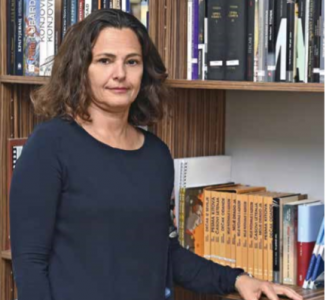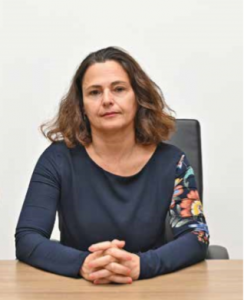Priorities and compatabilities of the two economies lie in the sectors of agriculture – smart agriculture, IT and innovation…

Ambassador of Israel to Serbia Alona Fisher-Kamm says in addition to big projects in the real estate sector, there’s a growing interest of Israeli investors to invest in other areas such as agriculture, water, renewable energy and waste treatment sector.
Last year, for the first time, an Israeli president visited Serbia. How much is the arrival of Ruvel Rivlin in Belgrade significant for our bilateral relations?
– It was a historic visit, the first ever visit of the Israeli President to Serbia. The visit confirmed a traditional friendship between our people with ties that bond us to the source of Zionism. During the visit, the two Presidents revealed the street named after Theodor Herzl , one of the founding fathers of the State of Israel and a leader of Zionist movement, whose family was from Zemun. In order to strengthen and broaden the economic activity which has a huge potential to be utilised, both sides agreed to set up a Mixed Committee for Economic Cooperation.
Israel is one of Serbia’s most important trade partners. According to your data, what did the trade between Israel and Serbia amount to last year? In which fields can companies from the two countries establish cooperation?
– The level of trade is on the steady rising trend which we hope will keep and enlarge in volume. Our bilateral trade went up by 10% last year, it stood at the level of 72 million USD which is a way below its potential. One of the obsta cles that affects the level of trade is definately non existing free trade agreement between our countries. This makes goods from both countries less competitive. If we talk about areas for economic cooperation, our priorities and compatabilities of the two economies lie in the sectors of agriculture – smart agriculture, IT and innovation, cleantech and renewable energy along with the growing needs in cyber security.
Representatives of Serbia often say that, to them, Israel`s economy is a good example of development and growth based on the latest technologies and innovations. In what way has your state helped this development?
– In the mid ’80s, after the big economic crisis the country faced, the goverment made a strategic decision to make knowledge and innovation as the base of the future economic growth. Israel is a country poor in natural resources including shortage of water, 60% of the country is desert with a position in a non friendly geopolitical environment. In order to survive we needed to overcome these weaknesses and turned them into our advantages. As part of its’ strategic vision and decision, the government took a set of measures to create supportive legal framework and innovation ecosystem. Among them is the fact that Israel is 2nd in global R&D spending as percentage of GDP. This investment is the national priority, not being affected by everyday politics. At the begining of creation of an ecosystem the role of government was important. The government offered incentives for multinationals eager to open R&D facilties in Israel. Through its Yozma program, the government assisted in creating first 10 VC funds in the country. The Israeli Innovation Authority – at the time Office of the Chief Scientist, has been formed in order to provide grants for startups. The project of Cyber Spark – cyber security tech park in Beersheva is a very good example of cooperation between the government, academia, municipality and industry. Today in Israel, with all the elements of the ecosystem been highly developed, we can say that the government role has been limited, still important in backing and inaugurating new ideas with high risk.

Israel and its citizens have faced numerous challenges throughout their history, just like Serbia. It seems that, when it comes to your country, this has additionally stimulated the development of innovations, especially the IT industry in recent times.
What could, then, Serbia learn and implement from the Israeli experience?
– Israel is a small country with 22000 sq.km. We live in a non-friendly neighborhood which together with the lack of natural resources adds to the challenging environment. This created a need for self sufficiency in terms of energy and water supply along with the orientation towards the global market instead of regional one which is not accessible. Due to the well balanced trade portfolio, the effects of the global economic crisis from 2008 were hardly felt in Israel. The economy also proved to be resistant to the ongoing conflict. In order to tackle the challenges and turn your weaknesses into advantages innovation was the answer! It was logical, taking into considerations all the mentioned constraints, to direct the economy towards the export of IT services. Today, Tel-Aviv is ranked the 2nd best innovation ecosystem globally by The Startup Ecosystem Annual Report. It is the 1st for density of startup ventures per capita. There are around 5000 start ups in Tel Aviv currently and 350 multinational companies with R&D offices across Israel. Our embassy follows closely and supports achievements of Serbia in this sector. It is worth noting that IT services became the top exoprted item of the country with the highest growth rates! This gives Israel opportunities to expand already existing cooperation. We beleive we can share our experience and know how with Serbia which develops its IT sector under similar circumstances.
Serbia and Israel sign Agreement on Prevention of Double Taxation. How important this is for investors?
– In November last year we signed the very Agreement which has already been ratified by the Serbian Parliament. The Agreement, once entered into force, will ease investments and doing business of residents and business entities originating from both countries and its subsidiaries. It will assist residents to pay personal income tax in one country and companies with subsidiaries to pay corporate profit tax in one country.
How often do Israeli businessmen turn to you for advice as to how to reach the Serbian market and how do you present Serbia as an investment destination to potential investors?
– We are witnissing an increased interest of Israeli companies in the Balkans and Serbia in particular. Companies address us constantly on the conditions for investments and doing business. They look for new markets. Interest is mainly connected to placement of the Israeli technology in the areas of smart agriculture, IT services, cyber security solutions. Taking into consideration growing needs of Serbia in the water treatment sector, the Embassy will, for the first time, organize a special Water treatment and Water Management conference in June with aim to introduce the Israeli technology to Serbian public utilities and municipalities.